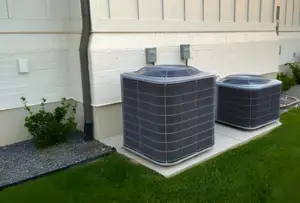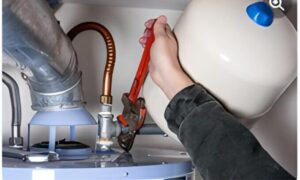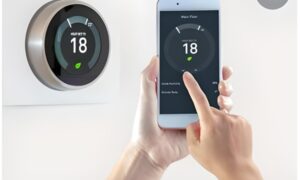As the HVAC industry continues to evolve, advancements in technology have ushered in a new era of comfort and cost savings. The introduction of variable stage compressors and heat pumps has revolutionized the way we cool and heat our spaces, offering improved energy efficiency and noise reduction.
Another innovative solution, mini splits, have gained popularity for zoned air conditioning without the need for ducts, providing customizable temperature settings and unobtrusive fixtures. Integrated air purification systems have also become essential for ensuring improved indoor air quality, while smart thermostats enable convenient temperature adjustments and increased energy savings.
Additionally, the durability of modern HVAC components has been significantly enhanced, resulting in longer-lasting systems and reduced maintenance needs. But what other exciting developments are on the horizon? Stay tuned to discover the latest HVAC technologies that are set to boost comfort and savings even further.
Variable Stage Compressors and Heat Pumps
Variable stage compressors and heat pumps are advanced HVAC technologies that provide improved comfort conditions and energy efficiency compared to older single-stage systems.
Unlike single-stage systems, which always run at full capacity, variable stage compressors and heat pumps can adjust their output to match the required cooling or heating load. This means that they can operate at lower capacities when the demand is lower, resulting in reduced energy consumption and lower utility bills.
Additionally, variable stage compressors and heat pumps offer better temperature control and humidity management, leading to enhanced comfort levels. These systems also have quieter operation and longer lifespan due to reduced wear and tear.
Mini Splits for Zoned AC Without Ducts
Mini splits offer a ductless alternative for zoned air conditioning, seamlessly transitioning from the advanced variable stage compressors and heat pumps discussed earlier. These modern AC systems work without the need for ducts, as small units are installed in each room or area.
Mini splits allow for the creation of a zoned system, where different temperatures can be set in different areas. The units are small and unobtrusive, and can be installed in ceilings or on walls, without blocking windows.
With mini splits, there is no need to install separate air purifiers in each room, as they can be integrated into the HVAC system. Additionally, mini splits provide improved indoor air quality and enhanced energy efficiency.
Integrated Air Purification
With the integration of air purification systems directly into HVAC systems, indoor air quality is significantly improved, ensuring safer breathing for occupants. These integrated air purification systems work in conjunction with HVAC systems to constantly filter the air and remove dangerous contaminants. Using modern technologies such as UV and other advanced filtration methods, these systems eliminate the need for separate air purifiers in each room.
Smart Thermostats
Smart thermostats have revolutionized the way we control and manage our HVAC systems, providing convenient temperature adjustments and improved energy efficiency. With smart HVAC controls, temperature scheduling based on schedule and needs is now possible.
These thermostats allow for AC adjustments to be made from a smartphone, offering convenience without interrupting activities. By lowering the AC when nobody is home, homeowners can save money on energy costs.
Additionally, smart thermostats contribute to improved comfort and energy efficiency. They help optimize HVAC system performance by learning user preferences and adjusting settings accordingly. Some models even offer advanced features such as occupancy sensors and geofencing, further enhancing energy savings.
With their user-friendly interface and smart capabilities, smart thermostats are an essential component of modern HVAC systems.
More Durable Components
New air conditioning equipment is designed with more durable components, ensuring increased longevity and reducing the need for frequent replacements. Outdoor units are now made with more durable materials, such as rust-proof base pans, cabinets, and fasteners. These improvements enhance the durability and reliability of the air conditioning system, resulting in longer service life and reduced maintenance costs.
By using sturdier materials, manufacturers are addressing common issues like corrosion and wear, which can affect the performance and efficiency of the equipment. With these advancements, homeowners and businesses can benefit from an HVAC system that operates efficiently for an extended period, providing consistent comfort and energy savings.
The increased durability of components contributes to the overall improvement in the performance and reliability of modern air conditioning systems.
Frequently Asked Questions
What Are the Main Benefits of Variable Stage Compressors and Heat Pumps Compared to Single-Stage Systems?
Variable stage compressors and heat pumps offer several benefits compared to single-stage systems. They provide improved energy efficiency by running at different capacities based on demand, resulting in energy savings and reduced wear on parts. Additionally, they offer better comfort conditions, reduced noise levels, and the ability to provide both heating and cooling.
How Do Mini Splits Work Without Ducts and What Are the Advantages of Using Them for Zoned Ac?
Mini splits are ductless AC systems that use small units installed in each room. They create a zoned system with different temperatures in different areas. They are unobtrusive, don't block windows, and can be installed in ceilings or on walls.
Can Integrated Air Purification Systems Effectively Remove All Types of Contaminants From the Air?
Integrated air purification systems are effective in removing a wide range of contaminants from the air. Incorporating modern technologies such as UV filters, they work in conjunction with HVAC systems to constantly filter and improve indoor air quality, ensuring safer and healthier breathing.
How Do Smart Thermostats Improve Energy Efficiency and Comfort in HVAC Systems?
Smart thermostats improve energy efficiency and comfort in HVAC systems by allowing temperature scheduling based on schedule and needs, making AC adjustments from a smartphone, and saving money by lowering AC when nobody is home.
What Specific Components of New Air Conditioning Equipment Contribute to Its Increased Durability and Longevity?
New air conditioning equipment has more durable components, such as rust-proof base pans, cabinets, and fasteners. These improvements contribute to increased longevity, reducing the need for frequent replacements and ensuring the system's reliability and performance over time.
Conclusion
In conclusion, advancements in HVAC technology have revolutionized the industry, providing enhanced comfort and cost savings.
Variable stage compressors and heat pumps offer improved energy efficiency and noise reduction.
Mini splits provide zoned air conditioning without the need for ducts.
Integrated air purification systems ensure improved indoor air quality.
Smart thermostats offer convenient temperature control and energy savings.
Additionally, the durability of modern HVAC components has been significantly enhanced, resulting in longer-lasting systems and reduced maintenance needs.








